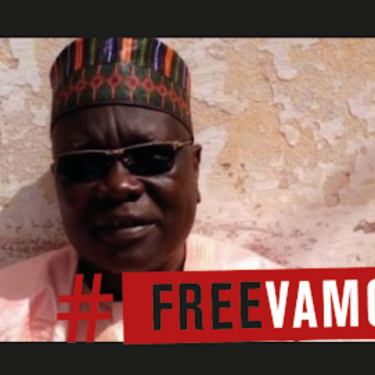1,600th day in prison, 50th court appearance for top Cameroonian journalist

Reporters Without Borders (RSF) reiterates its call to the Cameroonian authorities to end their completely unprecedented persecution of the former head of the country’s state radio and TV broadcaster, who has been held since 2016 and is due to appear in court this week for the 50th time on a trumped-up charge for which no evidence has ever been produced.
Amadou Vamoulké knows his way around Yaoundé’s Kondengui prison and special criminal court better than he does around his own home, which was under construction when he was arrested on 29 July 2016.
He will appear before the special criminal court’s judges tomorrow for the 50th time on charges of “misusing funds” – not for his person benefit but for the benefit of Cameroon Radio and Television (CRTV), which he ran from 2006 until his arrest in 2016.
Prosecutors have never produced any evidence in support of this trumped-up charge in any of the hearings, which continue to be held in violation of the defendant’s most basic rights. Vamoulké will complete his 1,600th day in preventive detention this week, which is three times longer than allowed by Cameroon’s penal code and six times longer than allowed by the special criminal court’s regulations.
“Never in Cameroon’s history has a journalist been subjected to such a level of judicial persecution,” said Arnaud Froger, the head of RSF’s Africa desk. “After 1,600 days in prison and what is about to be a total of 50 hearings, all that has been demonstrated in this case is the vacuousness of the charges against him, the crude attempts to conceal evidence attesting to his innocence, and the vile plot to crush this prominent journalist despite his age and poor health. Everything seems to have been done to ensure that he dies slowly in prison without ever having been tried.”
The UN Working Group on Arbitrary Detention has ruled that Vamoulké’s provisional detention has “no legal basis” and that “the violations of the right to due process are of such gravity that they confer an arbitrary character on [his] detention.”
The Working Group, which issued these definitive findings in June after being referred the case by RSF in 2019, also called for his immediate release, voiced “deep concern” about the “gravity” of his condition and said it had referred the case to the UN special rapporteur on the right to health, a mechanism that RSF had also already activated. We await the rapporteur’s findings.
The fate of Cameroon’s journalists, who have often been exposed to terrible abuses in recent years, is a source of concern abroad. There was an international outcry last June when, more than ten months after the events, the Cameroonian authorities confirmed that the journalist Samuel Wazizi had died in very suspicious circumstances while being held incommunicado by the military. The findings of the independent inquiry promised by President Paul Biya are still awaited six months later.
Cameroon is ranked 134th out of 180 countries in RSF's 2020 World Press Freedom Index.



